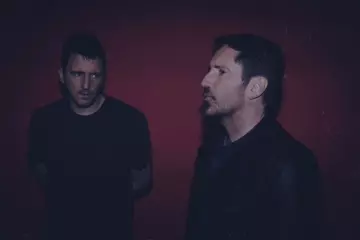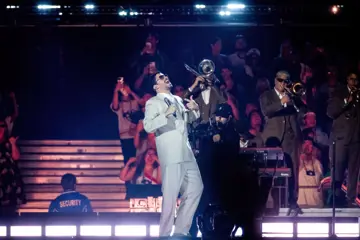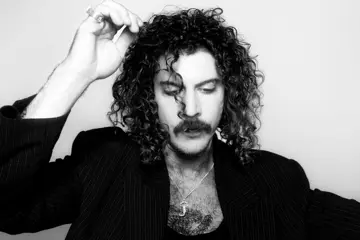 Fucked Up
Fucked UpThe last few years have been kind to Canadian hardcore outfit Fucked Up. Their 2008 sophomore album The Chemistry Of Modern Life scored them the prestigious 2009 Polaris Music Prize (the Canadian equivalent to the UK's Mercury Prize), and its follow up David Comes To Life (2011) made the shortlist as well. They've been showered with accolades and toured the globe extensively, playing major festivals and sharing stages with a slew of bands they love as well as behemoths from other realms such as Foo Fighters. But judging by the lyrics of their killer new album Glass Boys there's a massive disconnect between these accomplishments and the ideals inherent in the scene where they earned their stripes.
“I definitely wanted it to have some form of intermingling concept – I wanted it to be an incredibly angry, bitter record,” admits frontman and lyricist Damian Abraham. “When we first started writing it I was very mad at myself and at a lot of other things, and I think The Art Of The Patrons is the very first song I wrote and that's pretty much the angriest lyrics on the record. [There's a] consistent concept running through the record about ageing and ageing within music and ageing as a music fan and a music lover and becoming embittered by it but then ultimately realising [just] how awesome it is.”
The Art Of The Patrons is indeed rife with vitriol, reeking of an existential bent regarding Fucked Up's apparent divergence from hardcore's stringent principles.
“There's a guilt – a guilt that I'm going to carry with me for the rest of my life – that I should be able to do what I'm doing,” Abraham reflects. “I sit here in my office and look at thousands of seven-inches in front of me by bands that probably were better than us in a lot of cases but didn't get past the seven-inch stage, so there's a guilt along the lines of, 'Why us? Why are we the band that's able to take advantage of all these opportunities?'
“Then there's this realisation that while you're having a good time and dancing around, a lot of where you came from is being eroded away and part of you is being eroded away in the process. That song stems from sitting at this awards show and looking around and seeing that I'm surrounded by every Canadian music industry arsehole that I hated, and the reason I started this band was because I didn't want anything to do with these people's world.
Don't miss a beat with our FREE daily newsletter
“I found this music that had nothing to do with these people's world and I wanted that to be my scene, and then all of a sudden I've woken up ten years later and I'm where I hated the most and I'm part of that. I don't think I'm as bad [as them] but at the same time it's, like, 'Why the fuck am I flirting with this world?' and I think that's what that song is about – realising that you're losing your voice as a musician because financially you're accepting more and more opportunities where people are kind of restricting your voice. There's a lot of guilt in that song – a lot of guilt.”
But surely such dogma is only relevant if you've achieved success by compromising your ideals, something that Fucked Up could never be accused of?
“No, but I think you can wind up serving a bit as a Trojan horse,” Abraham counters. “I do another job where I interview bands on TV, and once in a while one of the bigger labels will come and say, 'Hey, we want Damien to interview this artist,' which is almost like a tacit approval that that person is somehow cool. Not that anyone's going to be, like, 'Oh this is cool, Fucked Up thinks it's good!' but at the same time it makes you realise that you're part of the game, just another piece in the chess board that is the music industry. One thing that's so amazing about punk and hardcore is that they're, like, 'Fuck that chess board!', but then all of a sudden you realise, 'Hey, it looks like I'm on that chess board! I guess I'm a piece now in that game.' I don't think we've ever compromised, but once you start letting yourself into that world you start second guessing and over-analysing everything.
“I don't feel I owe anyone else something, but I do feel that I owe me. In my teenage years and my early-twenties – and I don't want to make it seem like this is all I had because I always had my family that cared about me – but when I was in these really horrible and dark places this music is all I had, and I want to do right by that angry kid who was the reason that I'm in Fucked Up. I feel like I will always owe that angry kid, and I always want to do right by that angry kid that's inside of me. And when I don't do right by that little angry person he tears me apart on the inside. And I'm glad, because it's probably prevented me from doing some really terrible, stupid shit with this band. At the end of the day my family is the biggest thing in the world to me, but I don't want to hurt this larger community that's a bigger thing to a lot of other people – I can always find another way to help my family. I don't think I'm hurting it, but that's the constant cycle of fear that I go through.”















